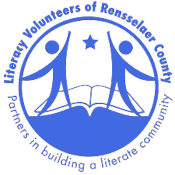Our 100+ volunteer tutors are your friends, neighbors and relatives who are contributing to our community by helping others help themselves.
No prior teaching or tutoring experience is necessary. We will train you to become a literacy tutor to adults and we will support you after you have been matched with a learner who has shown the interest and initiative to enroll in our program. Check out our calendar for a complete list of training dates and locations.
Please see our Tutor FAQ’s below for more information.
No, we will train you. We ask tutor trainees to have at least a high school diploma or a GED. You will need to fill out a volunteer application form and provide two references.
Our learners come from all walks of life. About one-third of our learners are American-born adults who need to improve their reading, writing, math, and computer skills. The remaining two-thirds are immigrants and refugees who are learning to speak English, often for the first time. Students live in Albany, Rensselaer and Schenectady counties. Students each have personal goals for why they want to learn English. It could be to gain employment, become a citizen, or talk to their child’s teacher. Each learner is unique.
The Tutor Training Workshop consists of two in-person sessions and two self-paced online courses. The in-person sessions take approximately 2 hours, and the online courses take anywhere from 3-6 hours depending upon your learning process. The online courses provide participants the opportunity to learn about, practice, and discuss the process of tutoring a Basic Literacy Learner (BLL) and English Language Learner (ELL). Additional online courses are available, such as math and citizenship, and all online courses remain open for tutors to refer back to.
We offer a hybrid training that includes a combination of in-person and online training. It is recommended to participate in both types of training so you get to meet staff and your fellow tutors.
Trainings are ongoing, if you miss an in-person workshop you are welcome to join the next one or reach out to staff to schedule a make-up session.
We ask tutor trainees to pay a fee of $35 to cover the cost of a text book and supplemental materials. If the fee presents a hardship, scholarship money is available to cover the cost of the materials.
You will be paired with a learner at the end of the Tutor Training Workshop.
Tutors and students are matched based on location and availability. During the final training, tutors are asked to fill out a preference form to indicate what kind of student they would like to work with. Tutors and students may discuss with staff if a match is not working out and they will be rematched. LVORC may have up to 50 students waiting for tutors at any given time. Please consider instructing a small group to accommodate more students.
Yes, LVORC has a resource library for tutors. Our staff can help you to locate additional resources and answer questions about tutoring. A Tool Kit for Tutors and Learners is available on our website. In addition, all LVORC volunteers can attend any of the professional development workshops for tutors offered by the Regional Adult Education Network. You can meet other tutors and enhance your skills at free trainings offered by professionals in the field of Adult Literacy. To view a calendar of training and professional development workshops for volunteers, visit www.capitalnorthraen.org
We encourage tutors to meet with learners at public locations such as libraries and community rooms. Locations should be convenient and accessible to both parties. There is also private space available at our Albany and Troy locations.
Why Tutor?
By Nina Halebsky
There are so many reasons why tutoring is a rewarding experience. First and foremost is the appreciation a student shows when they realize they are able to make progress toward their literacy goals. How valuable it is for them to have a special relationship with someone who can focus with them on their specific learning needs. Being patient, being available, being their ally is gratifying and a gift for both tutor and student. It is a way of demonstrating that all people deserve getting the help they need. If I can give back to someone in this way, I feel I have contributed to their sense of dignity and supported them to better themselves. As a teacher who has worked with regular and special needs children for over 10 years, I now sometimes have the privilege of assisting adults who continue to need support. Literacy barriers can be true obstacles for adults, but with the motivation to be productive, an adult student will approach literacy learning with an added sense of urgency and interest. This makes the job of tutor especially valuable.
Sharing a sense of accomplishment and providing encouragement for successes big and small keeps me motivated to continue. Finally, I truly enjoy getting to know my students as people, and we look forward to spending time together.
